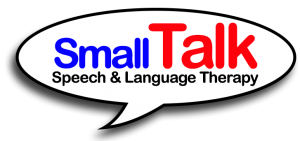Ages & Stages
The following is a guideline of typical language development. There is a wide range of normal development and many children will reach different stages at different times. If you feel your child is behind in their development of language it is recommended that they have a language assessment.
0 – 4 months
- appear startled by loud noises and settled by your voice
- learn to turn to you when you speak
- smile when they hear your voice
- will stop their activity and listen closely to the sound of an unfamiliar voice
4 – 6 months
- starting to coo and laugh
- begin to make noises (e.g. ahhhhh, eeeee) and appear to be communicating.
- eyes move toward sounds and facial expressions change as a response to your voice
- respond to the word “no”
- responsive to changes in your tone of voice, and to sounds other than speech, e.g. they can be fascinated by musical toys, and search for the source of new sounds such as the toaster, birdsong, sound of machines.
5 – 6 months
- early consonants develop, e.g. b, m, g, d
- vocal play includes variety of pitch and range
6 – 9 months
- simple babbling, e.g. “bababababa, mamamama, geegeegee, ah-goo”
- copy actions and sounds, e.g. clapping hands
- respond when their name is called and turn head towards sound
- discover the fun of games like “round and round the garden”, “peek-a-boo” and “pat-a-cake”
9 – 12 months
- more complex babbling e.g. “badamemagaga”
- beginning say first words e.g. “mum”, “dad”, “bottle”
- starting to recognise the names of familiar objects, e.g. “bottle”, “Grandma”, “eyes”, “book”, “car”
- begin to respond to requests (“Give it to Daddy”) and questions (“More juice?”)
- use gestures such as pointing or pulling things to communicate what they want
12 – 18 months
- can say some basic words and understand basic instructions
- respond to and recognise familiar sounds such as the telephone ringing, the vacuum cleaner, or the car in the driveway
- understand the names of familiar objects and people
- enjoy songs, music and books
18 – 24 months
- at 18 months says around 5-20 words but understands many more
- can point to common body parts when asked
- plays with toys and uses objects appropriately, e.g. pushes car along floor, cuddles doll etc
- starting to combine two words to make simple sentences, e.g. “Mummy go”, “Daddy car”, “Where Nanny?”
- can point to pictures of common objects in books when asked
- understand simple “What’s that?” questions
- use words more often than gestures
- understood by non-family members about 50% of the time by 2 years of age
- holds out toys or other objects to show people
- talk to themselves or their toys during play
- uses 200-300 works by 2 years
2 – 3 years
- understand longer instructions or questions, e.g. “Get your shoes and put them in the box”, “What do you want to eat for lunch today?”
- ask lots of questions
- can label a large range of pictures, objects and actions
- use 3 – 4 word sentences
- can answer “Wh” questions such as “What’s this?”, “What is the boy doing?” and “Where is it?”
- begins using grammar e.g. using words like “a”, “the”, “-ing” at the end of words, “he, she, it”
- enjoys telling stories and asking questions
- has favourite books and television programs
- can answer “yes” and “no” questions
- is understood by non-family members most of the time by 3 years of age
3 – 4 years
- Knows basic colours and shapes
- Can ask and answer “who, what, where, why” questions
- Use at least 4 – 5 word sentences
- Can tell short stories or sequences, e.g. “I went to preschool and played on the swings”.
- Use at least 1000 different words and understands many more
- Use grammar appropriately most of the time
- Use language while playing with other children
4 – 5 years
- Combines 5 – 8 words in a sentence using correct grammar
- Can tell a long story in sequence, however they might not stick to the same idea throughout the whole story
- Beginning to ask and answer “when” questions
- Understand the concept of opposites, e.g. high and low, wet and dry, big and little
- Talk about events which are happening, have happened or might happen
- Explain why something happens, e.g. “Mum’s car stopped because the petrol ran out”
- Can follow instructions with three parts
- Can talk about their ideas and how they feel
- Understand the difference between day and night
5 – 6 years
- Understand time concepts e.g. morning, afternoon, yesterday, today, tomorrow, before, after
- Use full sentences with correct grammar almost all the time
- Can tell a long story appropriately
- Can name the days of the week in order
- Can make predictions about what will happen next in a story
Hornsby, Hornsby Heights, Asquith, Mount Colah, Mount Kuring-gai, Mt Kuring-gai, Berowra, Waitara, Wahroonga, Warrawee, Normanhurst, Thornleigh, Westleigh, Pennant Hills
